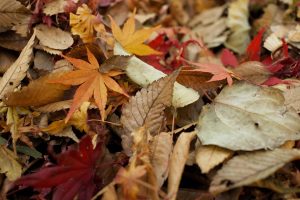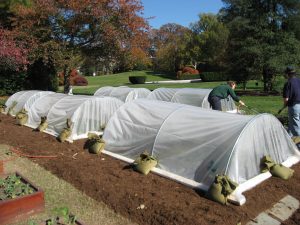Even in the late fall or early winter there’s always something to do in the yard. Garden work done now will ease spring planting chores. Whether you have a flower garden, basic landscape that needs upkeep, or a massive vegetable garden, here are a few tips to keep your garden in pristine shape.
Flower Gardens
Prepare for your spring garden by planting those beautiful daffodil, hyacinth and tulip bulbs! Inspect bulbs prior to planting to ensure there’s no discoloration or rot. Your garden will look splendidly colorful come spring.
Weed perennial beds and add mulch or compost to your garden beds to protect from frost damage.
Remove dead wood from rose bushes and reduce their height to about waist level to protect them from wind and ice damage. Bare-Root Roses can be planted now through March.
Spring flowering trees like magnolia can be planted now.

It’s free mulch season! Gather fallen leaves, shred them and put them in your garden bed or compost and apply them as mulch. Be careful not to add diseased leaves. Plants like cherry trees, apple trees and rose bushes harbor diseases like black spot, powdery mildew and shot hole fungus. Do not add them to your garden bed or your compost pile as disease could spread.
Lift dahlia tubers, begonias and gladiolus corms to store over winter in slightly moist sawdust.
If you’d like, cut stems of holly with berries for Christmas garlands before the birds have a chance to eat them all.
Vegetable Gardens
Remember to plant garlic for next year’s harvest.
Harvest parsnips and cabbage after the first frost for a sweeter flavor.
Apply mulch or compost in your vegetable garden beds. To further enrich your soil consider using compost that contains manure.
Cover all of your lettuce, spinach, sorrel, chives, chard and parsley with floating row covers before the first freeze. Learn how to build the perfect garden tunnel.
Feed leeks with a well-balanced fertilizer, containing nitrogen, every 4-6 weeks while the plants are actively growing. You can also clump soil up around their base to begin blanching. They also love to be topped with compost.
If you are not planting a winter garden, plant a cover crop of clover and till it into the soil in early spring for a nice boost of nitrogen.
Loosely lay plastic of the top of potato bins to keep the rain out and dig up the tubers as needed. This is an ingenious way to create your own “cold storage bin” without actually building one. The root crops like potatoes, carrots and horseradish can be over wintered with this method; the key being to keep them dry and not letting any moisture in. The soil will stay cool with the correct amount of moisture to store root crops for a few months into the winter.
Fruit Gardens
When available, dormant cane berries can be planted.
During periods of dry weather prune pear and apple trees. This can be done from now through February. When pruning larger limbs, consider using Tree Seal to cover the wound, this will keep the tree from losing too much moisture in the cold and protect the limb over the winter.
 Prune back grape vines when fully dormant.
Prune back grape vines when fully dormant.
If your garden has had a moth problem in the past, apply glue bands to the trunks of your fruit trees to prevent winter moths from laying eggs in your fruit trees.
Harvest winter pears before they ripen on the tree and place in cold storage for a few weeks to prime them for ripening inside.
Clean strawberry beds and move rooted runners.
Indoor Plants & Herbs
You can grow your own mushrooms indoors. Now is a good time to invest in a mushroom kit when you have time away from the garden.
 Start an indoor herb garden as your outdoor garden requires less attention. Basil, Chives, Oregano, Parsley, Thyme and Sage are popular choices and will come in handy in the kitchen.
Start an indoor herb garden as your outdoor garden requires less attention. Basil, Chives, Oregano, Parsley, Thyme and Sage are popular choices and will come in handy in the kitchen.
Try planting bean & wheat sprouts indoors to add some excitement to your lunch sandwiches.
You can grow indoor amaryllis flowers which will offer your home aroma and color.
Lawn Maintenance
Aerate your lawn if needed.
Continue to clear fallen leaves to avoid diseased leaves spreading across your lawn and garden.
Set your lawn mower to a higher-cut for winter months.
Various Jobs Around Your Oregon Garden
If you see slug and/or snail trails in November, this means they will be around next spring. Trap and bait as many of them as you can before eggs are laid for next population. (Best results before a dry, sunny day).
Apply linseed oil after cleaning your gardening tools to help keep them from rusting.
Raise potted plants off the ground to prevent their drain holes from becoming clogged.
Weeds are still active and should continue to be pulled.
Transplant and prune deciduous trees and shrubs now while they are dormant.
Add texture to the garden by planting evergreen shrubs and conifers.
Outdoor plants in pots will need sheltering from frosty weather.
Top off bird feeders with food for the winter months and be sure they have fresh water available. The winter can be very hard for birds to find water that is frost-free and they need to drink daily.
